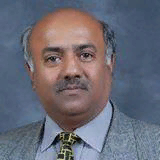
Asadullah Shah
Work place: International Islamic University Malaysia (IIUM), Kuala Lumpur, Malaysia
E-mail: asadullah@iium.edu.my
Website:
Research Interests: Computer Architecture and Organization, Computer systems and computational processes, Wireless Communication, Data Structures and Algorithms, Online social communication
Biography
Dr. Asadullah Shah is working as Professor at the Kulliyyah of ICT, International Islamic University Malaysia (IIUM) before joining IIUM, he worked as Head of Telecommunication Engineering & Management department, IoBM Karachi Sindh, Dean Faculty of Computer and Management Sciences, Isra University Hyderabad Sindh and Head of Telecommunication Engineering and IT, Sukkur IBA, Sindh-Pakistan.
He did his PhD from university of Surrey UK, in 1998, with specialization in Multimedia Communication. He started his academic carrier from University of Sindh Jamshoro, Pakistan in 1986 as a lecturer.
He has published 150 research articles in highly reputable international and national journal in the field of computers, communication and IT. Also he has published 12 books in his 28 years of academic carrier. Currently he is supervising great number of postgraduate students, working in multiple disciplines, specially, animation, social media and image processing in the Department of Information Systems, Kulliyyah of Information and Communication Technology, International Islamic University Malaysia.
Author Articles
Trust Modelling and Management for IoT Healthcare
By Abdul Rauf Riaz Ahmed Shaikh Asadullah Shah
DOI: https://doi.org/10.5815/ijwmt.2022.05.03, Pub. Date: 8 Oct. 2022
The IoT wave is on rise and it is considered as the biggest world changing computing ecosystem after the invention of Internet where the meaning of lifestyle is expected to be changed. IoT is now diffusing pervasively in most areas of life like smart home, smart cities, smart irrigation, smart healthcare etc. The concerned industry is trying to reap maximum benefits from this regime without putting extra efforts or investing much to make the related infrastructure secure and trustworthy. IoT end device, a.k.a smart object, is one component of this ecosystem, responsible to interact with the physical environment and gather the data, along with communication technologies, processing capabilities like fog or cloud computing and applications to interact with the device (s). It is possibility that such devices can be faulty, compromised or misbehaving because of internal or external factors like hardware malfunctioning or cyber-attacks. In this situation the data gathered and transferred by such devices can be disaster and challenging in decision making specifically in an area where the human life is involved like IoT healthcare. We have proposed a mathematical model to estimate the trust of such devices. Trust on IoT devices and gathered data from such trusted devices will boost the confidence of end users on this new computing regime; especially in healthcare environment. The estimated trust status (trusted, uncertain, and untrustworthy) will be saved in a database or CSV file with a timestamp to be used as reputation by healthcare applications. Patients are assigned their SOI based on their specific diagnoses and procedures performed during their medical encounter. Similarly, for a patient with heart diseases or having hypertension can be considered in extreme category with a value of γ = 1 if there is some deviation of readings.
[...] Read more.An Appraisal of Off-line Signature Verification Techniques
By Abdul Salam Shah M. N. A. Khan Asadullah Shah
DOI: https://doi.org/10.5815/ijmecs.2015.04.08, Pub. Date: 8 Apr. 2015
Biometrics is being commonly used nowadays for the identification and verification of humans everywhere in the world. In biometrics humans unique characteristics like palm, fingerprints, iris etc. are being used. Pattern Recognition and image processing are the major areas where research on signature verification is carried out. Hand written Signature of an individual is also unique and for identification of humans are being used and accepted specially in the banking and other financial transactions. The hand written signatures due to its importance are at target of fraudulence. In this paper we have surveyed different papers on techniques that are currently used for the identification and verification of Offline signatures.
[...] Read more.Other Articles
Subscribe to receive issue release notifications and newsletters from MECS Press journals